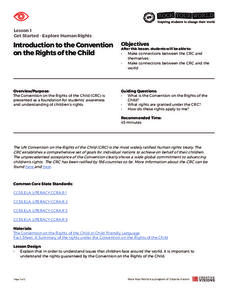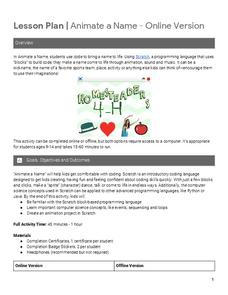WE Charity
Elementary–Module 3: Food Waste
Before pupils discard anymore of their uneaten vegetables, they may want to learn more about food waste. Here's a resource to help them do just that! Using discussion and video, scholars discover how innovators are tackling the issue. As...
WE Charity
Elementary–Module 2: Circular Economy and Nature
How can people do their part to help protect the environment? Learners participate in an engaging jigsaw activity to discuss the causes and effects of pollution. Next, pupils develop their own innovative ideas to address an environmental...
WE Charity
Elementary–Module 1: Sustainable Innovation
Where would society be without the innovations of Thomas Edison or Steve Jobs? Scholars explore what it means to have an innovative mindset. Working in small groups, pupils design a product or service to help solve a social,...
WE Charity
Activity: Exploring the Four Leadership Styles
Mahatma Gandhi, Nelson Mandela, and Mother Teresa were some of the greatest leaders of all time; what made them so great? Scholars discover the qualities of effective leaders using teen leadership activities. Learners complete an...
Creative Visions Foundation
Visual Interpretations of the CRC
How can people better understand the human rights that are guaranteed to children around the world? Pupils attempt to answer the question with the second of two lessons explaining the Introduction to the Convention on the Rights of the...
Creative Visions Foundation
Introduction to the Convention on the Rights of the Child
The UN Conventions on the Rights of the Child (CRC) has been ratified by 196 countries so far ... and still counting! Using the first of two lessons covering the Introduction to the Convention on the Rights of the Child, scholars learn...
PBS
Opioids in Our Community—Middle School
How do opioids affect the lives of families and individuals within a community? Scholars explore the topic with a series of informative, thought-provoking videos. They also complete worksheets and discuss the effects of the opioid...
Creative Visions Foundation
Open Your Eyes and Ears to Human Rights Issues
A human rights defender is someone who promotes and protects human rights for all. Scholars explore the subject with the fourth and final lesson from the Introduction to the Universal Declaration of Human Rights series. Pupils share...
Creative Visions Foundation
Introduction to the Universal Declaration of Human Rights
Many people don't realize that all people on the planet are entitled to certain inalienable rights. Scholars discuss the subject with the first of four lessons in the Introduction to the Universal Declaration of Human Rights series....
Newseum
Decoding an Editorial Cartoon
What advantages do political cartoons have over written editorials? Scholars discuss the topic by exploring editorial cartoons. Working in small groups, pupils analyze an Uncle Sam cartoon and complete a worksheet. As a fun extension,...
Reed Novel Studies
Hello Universe: Novel Study
Every neighborhood has its own unique cast of characters, and the crew in the novel Hello Universe is no exception. The characters in Erin Entrada Kelly's novel take center stage in a study guide based on the text. Readers answer...
Reed Novel Studies
Holes: Novel Study
Nothing good comes from being under a curse. A study guide introduces the novel Holes by Louis Sachar and the curse the main character faces. Readers analyze key vocabulary words from book, as well as complete a series of short writing...
Reed Novel Studies
Little House On The Prairie: Novel Study
Laura Ingalls Wilder memorialized life in the American West with her Little House on the Prairie series. Readers explore the first book in the series using a novel study guide. Along with standard text-based questions, scholars complete...
Macmillan Education
Christmas: #SadTree
Christmas trees can be as large and elaborate as the tree in Rockefeller Center, or as small and understated as Charlie Brown's tree in A Charlie Brown Christmas. But where did the tradition of Christmas trees come from? An engaging...
Reed Novel Studies
Homeless Bird: Novel Study
Many people face the struggle between tradition and desire to forget their own paths. A study guide for the novel Homeless Bird by Gloria Whelan discusses the issue of adhering to tradition from the perspective of a protagonist who faces...
Mrs. Robbins' Social Studies Site
The Berlin Blockade
The Berlin Blockade may not take up as much space in the history books as other events of the Cold War, but for the citizens of west Berlin in 1948—and the events to follow between the Soviet Union and the United Stattes—those 318 days...
Delaware Health and Social Services
My Life. My Plan: Women
Nationwide, over 40 percent of pregnancies are unintended. A lesson designed for women of childbearing age asks them to consider their goals and provides information about reproductive health. Learners view a PowerPoint presentation and...
New Brunswick Department of Education
Personal Development And Career Planning Curriculum Grade 9/10
What is the difference between a proactive person and a reactive person? Scholars explore the topic, and many others, with helpful lessons, discussions, role play activities, and games. Each activity supports one of the key principles...
Google
Adventure on the High Seas
Ahoy there! A fun computer science lesson challenges pupils to write a program that creates an ocean wave. They then develop stories to accompany their projects. All of this takes place within the Scratch coding program.
Google
Animate a Name
What's in a name? Pupils use the Scratch code blocks to animate letters in a name. They learn about events, sequencing, and loops in computer science by taking part in the project.
Google
Art: Greeting Card
Greetings from your computer science class! The culminating activity in the eight-part Google CS Art unit has scholars create digital cards. The purpose of the cards is to show their families what they now know about programming.
Google
Art: Digital Art
There's no need to filter out the project. Future computer scientists set up a program that acts like a photography filter to complete the sixth of eight parts in the Google CS Art unit. They use the turbo mode in the Scratch coding...
Google
Art: Graffiti
Your principal won't mind graffiti, as long as it's on a virtual wall. Scholars use the Scratch block-based computer language to write a program on graffiti. The program lets users place certain designs on a wall.
Google
Art: Paint with Tera
Here's a creative resource that definitely isn't paint by numbers. As the fourth in and eight-part Art series, learners create a paint program using the Scratch block code. By completing the activity, class members come to understand the...






















